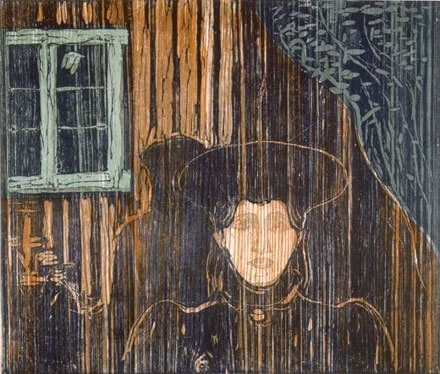Biography of Munch
(December 12, 1863)
The Major Cycles and other Disciplines

Moonlight I. 1896. Color Woodcut. Munch Museum
Munch returned to Paris, holding small exhibits at Salon Indépendants and Bing’s Art Nouveau Gallery. Paris afforded him the company of fellow artists and musicians, including Strindberg and Auguste Clot, with whom Munch collaborated for his first woodcuts. At this time, his focus was on the graphic arts, producing posters for Ibsen’s Peer Gynt and John Gabriel Borkman; and by 1984, Munch had learned to make drypoints. Many of his Frieze motifs provided the material for his initial attempts at printmaking, which he began as a means of making his art more accessible to the masses; and in 1986, he produced his first color lithographs.
Meier-Graefe and Bodenhausen published an initial portfolio of eight drypoints in 1895, to be followed by a more ambitious portfolio of 20 lithographs and woodcuts called Speilet (The Mirror), which was
announced in1897, but never completed. Since meeting with Strindberg in 1892, Munch had also become interested in photography and purchased a small camera in Berlin in 1902, which he used to document his work and to provide the basis for portraits and other compositions. Although he never felt his photography carried the merit of his art, he found it to be particularly useful in revealing character and used it extensive for self-portraits. His photographs reflected a more experimental attitude than Munch’s other disciplines, particularly with regard to their treatment of light and the use of blurring, motion, and double exposures.
After 1895, Munch spent considerable time traveling throughout France and Germany, including Copenhagen, Berlin and Paris. This, coupled with a turbulent romantic involvement with Norwegian Tulla Larsen which began in 1898, necessitated a stay in the sanitorium of Kornhaug in Gudbrandsdalen in 1899-1900. There he continued working on variations on The Frieze of Life.
Munch enjoyed a number of exhibitions in the early 1900s, including Kristiania, Berlin, Hamberg and Vienna. In 1902, The Frieze of Life – incuding the Love, Anxiety, and Death motifs - was exhibited in its entirely at the Berlin Secession. That year Munch sought to end his relationship with Larsen; the ensuing argument resulted in a gunshot wound to his left hand which left him with a permanent injury.
In 1903, he was awarded a state grant from Germany; and in 1904 he sold 800 prints and received commissions for portraits by numerous German aristocrats and industrialists. Despite intense psychological turmoil, Munch fulfilled his commissions, which included a frieze of 12 tempera paintings for the Kammerspielhaus of Max Reinhardt. Paintings commissioned for the childrens’ room of German collector Max Linde was completed in 1904, but was rejected as Munch did not produce the landscapes Linde requested.
Munch began painting a new cycle on love relationships, entitled The Green Room. Incorporating various stylistic approaches, these works continued to explore the motifs of The Frieze of Life, but focused more on group dynamics rather than individual relationships. This phase is evident in the monumental triptych Bathing Men (The Ages of Life) , wherein Youth, Maturity (Bathing Men) and Old Age celebrate the fraternal aspects of masculinity and virility.